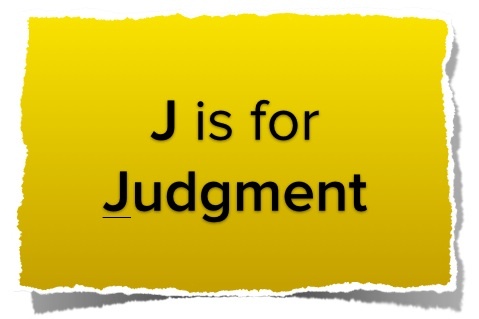Judgment is "the ability to make considered decisions or come to sensible conclusions."
My first startup taught me a lot of lessons in the world of sales. One of the reasons for that learning was the timing of the startup. It was founded in late 2000 when nobody was buying anything from anyone. To add to this, the company was bootstrapped creating a short runway.
The urgency to close deals would result in a LOT of activity with very little productivity to show. Since I would not want to lose ANY deal, the effort was distributed on ALL the deals -- the good AND the bad ones. Evenings and weekends were filled with work-related activities. I am not complaining about more work. However, the lack of judgment on relative importance of deals at play would sometimes result in less investment of time for deals that were real. It took me a couple of years before I started to learn to judge the relative importance of deals and appropriately distribute my mindshare and attention. Today, while I definitely am far better than before, I happily continue to be a student in this realm.
Here are a few things to help you practice better judgment.
1. Check Your Assumptions: The problem with an assumption is that it looks like truth when left unchecked. In his awesome book, Smartups, Rob Ryan talks about the power of assumptions. In his Sunflower model, the flower represents the core offerings. The stem represents the assumptions being made. You can see what happens to the flower when the assumptions are proven wrong. In this 30-minute talk on Assumptions, I share some of these assumptions we made in one of our startups.
2. Look and Listen: As a salesperson, you need to look for clues and listen to what's NOT being said. It is not the responsibility of the prospect to share every single detail that's relevant to you. However, it is your responsibility to get as much information as necessary to help you make a proper assessment of where you stand.
3. Respect the Feedback: One of the core tenets of Neuro-linguistic Programming is that the meaning of your communication is in its response. Many people don't know this and of the ones who know this, only a few of them are really paying attention to the response. You can make adjustments to what you are offering and your approach only when you respect and listen to the feedback you are receiving.
4. Remember the 80/20 Rule: Applying the Richard Koch's 80/20 Rule to the world of prospecting would mean something like -- "80 percent of your deals will come from 20 percent of the prospects." In his book "80/20 Sales and marketing: The Definitive Guide to Working Less and Making More," Perry Marshall says, "It is the ultimate simplifier because 95 percent of this stuff is a waste of time. It's literally the first thing any sales or marketing professional should master. It's not merely a rule of thumb, it's a law of nature.
Remembering the 80/20 Rule will help you re-focus your efforts to pursuing the right opportunities.
5. Get Good Help: Last but not the least; remember that it is not a weakness to ask for help. In the world of sports, you will notice that most champions have coaches that they have worked with for years. If you want to be a champion in the world of sales, it would help to have mentors and coaches on your side. They will ask you better questions to help you sharpen of your judgment of the situation.
If you are interested in other articles in this series so far, here they are:
A is for Alignment (title changed)
